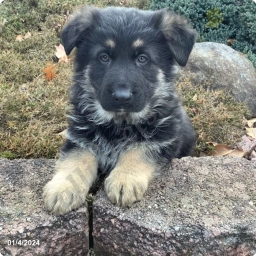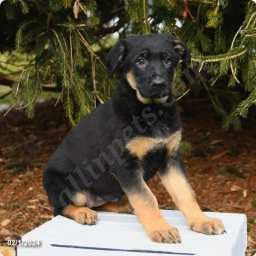History of the German Shepherd
The German Shepherd ties with the country of its birth so closely it seems like a landrace. Up until the end of the 19th century a multitude of sheep-guarding dogs, often uncategorized, roamed the pastures of every statelet of the part of Europe where it originated.
Scientific approach to develop a unified breed reflecting the spirit of the consolidating nation started at the turn of the epoch and is credited to a retired cavalry officer Max von Stephanitz. Breeders crossed herding dogs from diversified regional pools to create an agile, versatile, smart farm-and-field worker.
The US canine authority the AKC gave its recognition to the German Shepherd in 1908. President Biden is a known fancier, with his latest Commander dog often commanding unsolicited attention on the media for biting Secret Service officers as it wills. A lengthy list of celeb aficionados includes Jennifer Aniston, Jennifer Lopez, Elijah Wood.
German Shepherd Review
The German Shepherd is a large canine with well-developed watchdog skills, calm and restrained in normal circumstances. Easy to train, and given proper schooling, active, playful puppies of the breed full of energy would develop into non-conflicting, friendly house pets. These dogs would show aggression only where under intense stress.
Start educating the new member of the family from day one. Regular socializing begins at two months, as soon as the German Shepherd puppy you’ve bought exits its second vaxxing quarantine and is free to be walked.
This dog prides itself in intelligence and very limited maintenance needs. The easy-to-keep hair is not good for allergy sufferers. The psyche is enviously stable.
Breed Characteristics: What to Know Before Purchasing a GS
The loyal, reserved yet sociable German Shepherd is quick to establish close bond with the owner. It would share these traits commonly:
- Character: of peaceful nature, showing no aggression when not expressly provoked, and no wild mood swings. A lot of affection is on offer.
- Caring and interested in young children. The German would stand up to defend a child or a baby against any perceived threat almost on instinct. That said, your Shepherd shouldn’t be assigned unfitting nanny roles. Living with dogs and cats is the same household is okay for the well-balanced thing. Register this when considering buying a German Shepherd puppy.
- Shedding is profuse. Give you buddy a good brushing every other day, and daily during molting spells. Examine and wipe the eyes, clean the ears. Wash the paws and abdomen with warm water coming back from a walk. Bathe with shampoo once every two months.
- It was developed to be an easy dog to train, as humans are put at the center of its mindset. Pleasing the owner is like a must for German Shepherd puppies for sale. No further mental stimulation is usually required.
- Sizes? Height: 24-26 inches for males, 22-24 in for females. Weight: 65-90 pounds for a male, shrinking to 50-70 lb in females.
- 7 to 10 years of lifespan expected for a well-bred German Shepherd puppy for sale near me.
- Barking propensity: a moderate barker;
- Knows no heat or cold issues, weather-tolerant.
What Kind of Health a German Shepherd Has
This breed is not popular for nothing in the USA, it’s famed for strong immunity-backed health. The key to good wellbeing is meticulous execution of vaccinations and dewormings in German Shepherd puppies for sale.
That said, a responsible breeder you like for your pup would be eager to closely examine potential parents for conditions that cause concern like degenerative myelopathy, hip and elbow dysplasias.
Allergic disorders, joint dysplasia, otitides and stomach upsets are registered. Most of these are prevented with proper care and close attention to the health of your new family member. Infections wouldn’t run riot with a bit of extra effort.
Take dysplasia that may cause arthritis later on in life. A sound breeder, healthy diet and restricting jumping opportunities are a sure way to contain this risk.
What Health Tests Are Recommended
A range of testing tools are applied to expose and check any potential health issue. Ask your breeder to provide results for these:
- Canine degenerative myelopathy
- Dwarfism
- Ectodermal dysplasia
- Hyperurikosurie
- Canine leukocyte adhesion deficiency
- Malignant hyperthermia
- Canine herpes virus
- Renal cystadenocarcinoma and nodular dermatofibrosis
- Scott syndrom
- Von Willebrand disease DNA test Type I (Types II and III would be welcome as well).
Close interbreeding is always a sure way to complications in the future. Order DNA testing like myotubular myopathy to stay on the safe side with this significant portion of genetic conditions.
German Shepherd Puppy Price
The versatile German Shepherd offers everyone’s idea of a dog by the book. No wonder this breed enjoys huge demand from the public, but also sees a sea of suppliers. Sex, breeder’s reputation and pedigrees, if any, all affect price of German Shepherd puppies. Pre-trained pets cost more. A handler-educated pup may have accumulated skills and learned as many commands by 5-7 months as a comparable animal aged 1-1,5 years raised by an amateur owner.
Costly test results indicating no congenial pathologies were established with a puppy (as duly provided by the breeder) would drive estimates further upwards.
Buy German Shepherd Puppy from a Breeder
Breeder-sourced puppies (as opposed to ones procured from casual sellers) come with purebred guarantees. Connect the producer to get the full list of medical procedures and tests done; some health data would require reevaluation later in dog’s life. Getting to know the pup’s parents (also available through videos provided by the seller; you may ask for a live feed as you wish) would give you a better idea of the puppy’s character, as basic traits are commonly inherited (and potential problems underlined).
To have a peace of mind when you buy a German Shepherd puppy, ask the breeder for as many details as you like.

 Pets
Pets Services
Services
























